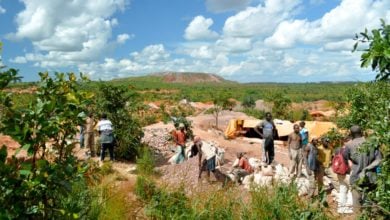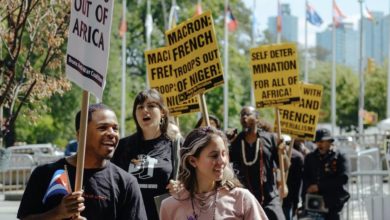“Humanitarian intervention” is a term widely used in today’s political lexicon. It is one of the main justifications used by imperialist powers to intervene in the internal affairs of less powerful nations.
|
Such imperialist operations often start in countries with real conflicts and tensions. The U.S. government and leaders of other powerful capitalist countries always paint the side most useful to their own ends as the “good guy” and the others as the “bad guys.”
Trips to refugee camps and pictures of starving children win over Hollywood celebrities, who then champion the cause. Politicians decry the leader of whichever country is targeted and demand that they be brought down. Complex situations are reduced to cartoonish abstractions in which “freedom” must triumph over “evil.”
Fiction soon gives way to reality. In a successful intervention’s aftermath, the country’s pro-western “savior” guarantees a swift institution of economic policies firmly rooted in a devastating neoliberal agenda.
It is likely that we will see the term “humanitarian intervention” quite a bit in our future as imperialist countries look to intervene increasingly in continents such as Africa and Asia. The indictment of Sudanese President Omar al-Bashir for war crimes and the recent electoral crisis in Zimbabwe have both raised the specter of renewed colonial and neo-colonial interventions.
Washington’s creation of a new Africa Central Command has also increased fears of U.S. military and proxy forces intervening to implement policies of exploitation. As we analyze these new situations, even a small sense of history can give us quite a bit of insight.
Blood of a thousand victims
Starting in 1760, the Asante Kingdom—much of what is modern day Ghana—came into conflict with the British Empire over territory. The British were looking to expand their coastal colony known as the Gold Coast. In a series of conflicts from 1760 to 1872, the British and the Asante clashed until the Asante gained the decisive upper hand in 1872 by conquering the central and southern gold coast states.
During this time, the two sides inevitably came into regular contact with each other. For years, British army officers, captives and missionaries had reported lurid and false tales of massive “human sacrifice.” As Professor Ivor Wilks wrote in his book “Forests of Gold,” the Europeans were misinterpreting either “judicial killings” or “mortuary killings,” which were deeply connected to Asante culture.
British colonial authorities made no attempt to understand Asante culture. Instead, they helped whip up public opinion in England in favor of intervention by telling sensational stories that would be turned into horror tales for European newspaper readers.
A particularly apt example comes from the Daily Telegraph, as quoted in Wilks’ “Forests of Gold.” Describing the Asante capital of Kumase, the Daily Telegraph read: “A town over which the smell of death hangs everywhere. … A town where vultures hop at one’s very feet, too gorged to join the filthy flock … that lie the road; where blood is plastered … blood of a thousand victims … where headless bodies make common sport, where murder pure and simple … is the one employment of the King.”
The subsequent British campaign from 1873 to 1874 subdued the Asante. After a period of consolidation, the British colonial apparatus was firmly in control of the former Asante kingdom. Rather than freedom from a “barbaric,” “murdering” king, the people of Asante now had a colonial government. A colonial development plan was brutally forced on them. British colonialism meant dismal wages, high taxes, forced labor, brutal coercion, forced military service and no schools or education.
Cuba libre
In 1895, Cuban revolutionaries rose up against Spanish colonialism. They were led by José Martí and legendary Black general Antonio Maceo, among others.
The liberation fighters were able to make continued gains against the Spanish. In response, the local military governor, Valeriano Weyler, resorted to brutal tactics, hoarding 300,000 people into concentration camps.
While many people know how the U.S. corporate media exploited the explosion of the USS Maine, most have not heard that the “yellow” or sensationally biased press also waved the flag of Cuban nationalism in order to promote intervention in Cuba. Weyler earned the nickname “Butcher” from the Hearst newspapers. Widespread public support for the U.S. war against Spain was built by embellishing very real atrocities.
Cuba was not freed. Rather, the war resulted in total U.S. domination over Cuba, along with the Philippines, Puerto Rico and Guam. They were all turned into U.S. colonies. The Cuban revolution of independence—which had been led, in part, by a Black general―gave way to a vicious colonial government that established Jim Crow-style racism.
In the Philippines, the supposed liberation turned into an occupation that Filipinos heroically resisted from 1898 to 1902. U.S. troops killed 1.4 million Filipinos in order to pacify the islands for monopoly capitalism.
Lessons for the future
Progressive-minded people are right to be concerned about the conditions of people living in oppressed countries. But we should instinctively hesitate when those condemnations come from some of the biggest war-makers themselves. Demonization campaigns against leaders of oppressed countries must be greeted with great suspicion.
Intervention by the imperialists does not mean an end to people’s the suffering. The imperialists and their mouthpieces are always motivated by profit and domination, not justice and liberation. By nature, imperialist nation states cannot play a progressive role in the conflicts taking place in the world.
A people’s movement cannot remain an independent, progressive force by embracing the ideology and rationale of capitalist governments, no matter what rhetoric the governments employ. As long as imperialist forces are leading the struggle, suffering is extremely likely to increase.
In order to avoid assisting U.S. imperialism, progressives and revolutionaries in the United States must fight for self-determination and for the right of people to conduct their struggles without the interference of imperialist powers.







